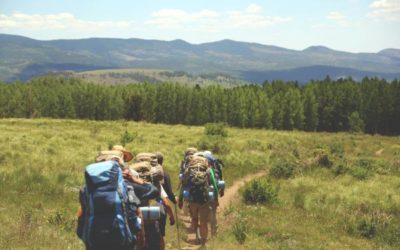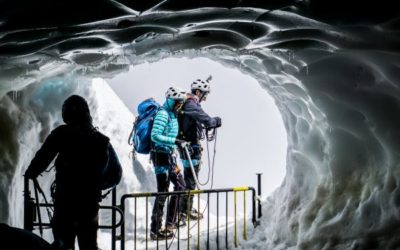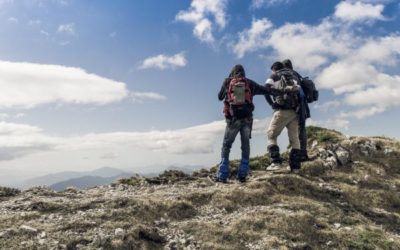 Renewing Your VISION in the Wilderness (a VISION Inductive Bible Study on Mark 2:1-12)
Renewing Your VISION in the Wilderness (a VISION Inductive Bible Study on Mark 2:1-12)
How Repentance and Confession of Sins is the Doorway to Experiencing God…
Biblical Literature Genre: Gospels
Age Group: Any
Setting : 1) River Crossing (where the group is helping one another across the river), 2) A difficult day of climbing or paddling where people are aware of carrying the weight on their back or feeling the burden of paddling a heavy load or against the wind, etc…. When we feel physically stretched we are often more open and desire to experience God and his closeness.
Timing: 1) If someone in the group is struggling and others begin carrying some of their weight to help out, 2) Any time the group is feeling heightened emotional or physical needs…
Set up: 1) Stop the group along the journey and ask some questions of the group about how they are doing so they become aware of the setting and their state of being, 2) Hand out the following questions or read a few of them to have the group write them in their journal for study during quiet time, 3) Send out the group for 20-30 minutes of time alone with God… encourage the group to find some space away from other people to consider the following questions… 4) An alternative would be to lead a 45 minute inductive study with the whole group using the same questions but you facilitating the discussion.
VISION STUDY QUESTIONS:
V: VERSE: Mark 2:1-12
When He had come back to Capernaum several days afterward, it was heard that He was at home. And many were gathered together, so that there was no longer room, not even near the door; and He was speaking the word to them. And they came, bringing to Him a paralytic, carried by four men. Being unable to get to Him because of the crowd, they removed the roof above Him; and when they had dug an opening, they let down the pallet on which the paralytic was lying. And Jesus seeing their faith said to the paralytic, “Son, your sins are forgiven.” But some of the scribes were sitting there and reasoning in their hearts,”Why does this man speak that way? He is blaspheming; who can forgive sins but God alone?” Immediately Jesus, aware in His spirit that they were reasoning that way within themselves, said to them, “Why are you reasoning about these things in your hearts? “Which is easier, to say to the paralytic, ‘Your sins are forgiven’; or to say, ‘Get up, and pick up your pallet and walk’? “But so that you may know that the Son of Man has authority on earth to forgive sins”–He said to the paralytic, “I say to you, get up, pick up your pallet and go home.” And he got up and immediately picked up the pallet and went out in the sight of everyone, so that they were all amazed and were glorifying God, saying, “We have never seen anything like this.”
I: INSPECT
• Make a list of the people involved in this story?
• What are some things we learn from the text about each of them? (Or have individuals in the group pick a person in the passage and focus on what they learn about them).
S: SEEK TO UNDERSTAND
• What are some reasons why Jesus might have spoken to the paralyzed man about sin before dealing with his physical need?
• Why do you think Jesus might have had for also healing the paralyzed man?
I: IMPLEMENT
• Jesus talks about his ability to forgive sins. Do you think forgiveness of sins is a need that people have today?
• Is forgiveness of sins a need you have experienced in your own life?
O: OBVIOUS QUESTIONS
• How, if ever, has forgiveness been important to you?
• Do you extend forgiveness to other people who sin against you as freely as Jesus extended forgiveness to the man in this story?
• The people in the story thought the man’s physical ailment was his biggest need, but Jesus did not agree—he saw his need for forgiveness of sins as a much greater need because it has such long-term consequences. Which of your personal needs occupy most of your time and energy worrying about? Could it be that repentance of your sins is a much more important need than the things that occupy your mind and cause you to feel anxious?
N: NUISANCE (anticipated obstacles)
• How might I be distracted by focusing on my immediate physical or emotional needs today rather than on my daily need to repent and confess my sins to Christ. If humility and brokenness are the doorway to experiencing God and his love, then what stops me from daily confession and repentance? Focusing on my temporal needs can produce bitterness and entitlement, whereas focusing on humbling myself before Jesus through confession produces a grateful attitude and the fruit of the Spirit in my life.
Followup: At lunch or dinner have the group bring their journals to the meal and have everyone sit in a circle and have a discussion. Ask the questions and invite people to share what they wrote down. Make sure to wrap up the discussion about what they learned about experiencing God with ideas how we can apply what we’ve learned to our individual lives as well as to our whole group and/or church, etc….
by Ashley Denton
Buy the Book on Amazon!
Thanks for following:
My Facebook (Click “Like” on the top of my facebook page you’ll get more regular, brief, updates from my travels that roll into your facebook page…)
Twitter @ OUTDOORLEADERS
Book & Resources: www.outdoorleaders.com
Blog “Visionary Leadership”: www.ashleydenton.org
Blog “Christian Outdoor Leadership”: http://bit.ly/gJn2Uy



